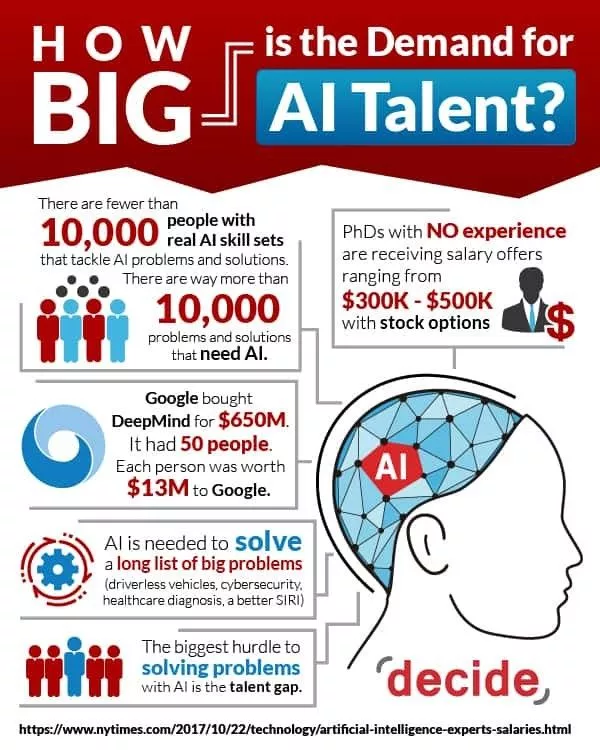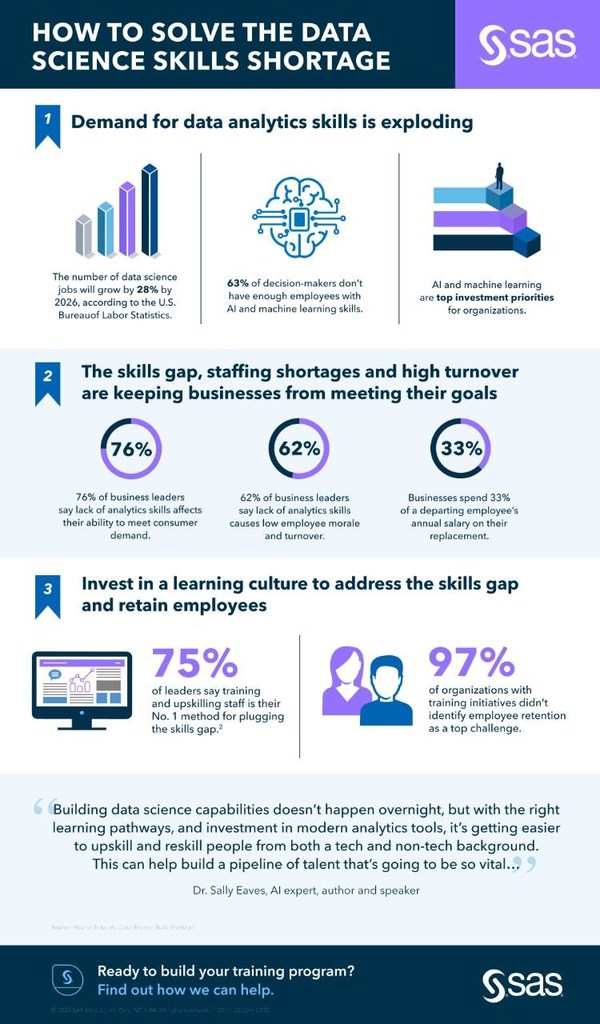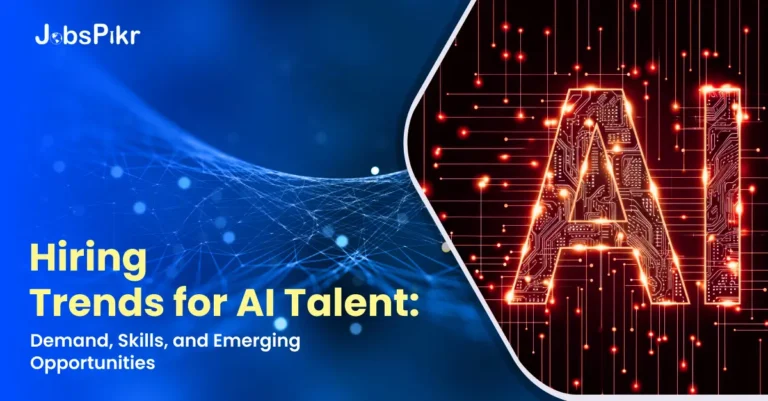Artificial Intelligence (AI) is revolutionizing every industry, from healthcare and finance to manufacturing and retail. As organizations increasingly seek to harness AI’s potential, the demand for skilled AI talent professionals has skyrocketed.
This surge has created new job opportunities but also revealed significant skill gaps. In this report, we will explore hiring trends for AI talent, examine the most sought-after AI skills, discuss existing skill gaps, and identify emerging opportunities for professionals and organizations.
Why AI Talent is in High Demand Right Now?

Image Source: DecideConsulting
Rising Demand Across Industries
The demand for AI talent has been increasing exponentially. A report from the World Economic Forum estimates that AI and related technologies will create approximately 97 million new jobs by 2025, as companies look to fill roles in data science, machine learning engineering, AI research, and beyond. Sectors such as healthcare, automotive, e-commerce, and financial services are particularly aggressive in recruiting AI talent to enhance automation, improve decision-making, and optimize operations.
In the U.S. alone, job postings for AI-related roles increased by 74% between 2021 and 2023, according to a Gartner Report. A similar trend is observed worldwide, with countries like India, Germany, and Canada experiencing double-digit growth in AI-related job postings. This demand reflects the competitive advantage AI provides to companies, driving the urgency to onboard skilled talent who can develop and manage AI solutions.
Key Drivers of AI Talent Demand
Several factors are contributing to the rapid increase in demand for AI professionals:
- Automation: Companies across industries are using AI to automate repetitive tasks, streamline workflows, and reduce operational costs. Roles in AI-driven automation are in high demand, particularly in manufacturing and customer service.
- Data-Driven Decision-Making: With the increasing availability of big data, companies are using AI to extract insights and make more informed decisions. Demand for roles like data scientists and AI specialists reflects this trend.
- AI-Driven Product Development: AI is becoming integral to product innovation, especially in the tech sector. AI-driven applications, from recommendation engines to autonomous vehicles, are pushing companies to seek talent capable of creating and managing complex AI solutions.
- AI in Healthcare: AI’s ability to analyze large datasets is transforming healthcare, from diagnostics to drug discovery. This trend is creating a surge in demand for AI professionals with expertise in healthcare data analytics and predictive modeling.
Must-Have Skills for AI Talent in Today’s Market

Image Source: DataScienceDojo
AI roles require a unique combination of technical and soft skills. Technical proficiency is essential for developing algorithms, analyzing data, and creating AI models, while soft skills like problem-solving and collaboration are necessary for implementing AI in real-world scenarios.
Essential Technical Skills
- Machine Learning (ML): ML is the backbone of AI, enabling systems to learn from data and improve over time. Proficiency in ML frameworks like TensorFlow, PyTorch, and Scikit-Learn is crucial.
- Data Science and Analytics: AI relies heavily on data, making data science skills—like statistical analysis, data mining, and data visualization—essential for AI professionals.
- Programming Skills: Python is the dominant language in AI, but other languages like R, Java, and SQL are also valuable. Knowledge of cloud platforms such as AWS and Google Cloud, which offer AI tools, is also increasingly sought.
- Natural Language Processing (NLP): NLP enables AI systems to interpret and respond to human language. As NLP is crucial in industries like healthcare and customer service, skills in NLP frameworks like spaCy and NLTK are highly desired.
- Computer Vision: The ability of machines to “see” is critical for applications in robotics, autonomous vehicles, and surveillance. Skills in computer vision libraries like OpenCV and frameworks like Keras are in demand.
Emerging Skills for Future AI Talent
Beyond traditional AI skills, new competencies are emerging in response to technological advancements:
- Explainable AI (XAI): As organizations implement AI, they require transparency in decision-making. Explainable AI is an emerging area that focuses on making AI algorithms more interpretable.
- Ethics in AI: With increasing scrutiny on AI’s societal impact, there is a growing demand for professionals who understand ethical considerations in AI, such as bias mitigation.
- AI Operations (AIOps): This combines AI with IT operations to enhance system performance and predictive maintenance. AIOps roles require familiarity with AI models and IT infrastructure.
Skill Gaps in AI Talent

Image Source: PRNewswire
Despite the demand for AI talent, a considerable skill gap persists, especially in advanced AI applications. The Economic Times highlights that nearly 76% of companies face talent shortages in AI. Below are some key areas where skill gaps are prevalent:
- Deep Learning: While machine learning is a well-known skill, fewer professionals have deep expertise in deep learning, which is crucial for complex AI applications like image and speech recognition.
- Advanced Data Engineering: Data engineering skills, especially those involving data pipeline creation, data cleansing, and integration, are scarce. Many companies struggle to find professionals who can manage big data effectively.
- AI Ethics and Governance: As AI becomes more prevalent, ethical considerations become more critical. Skills in identifying and mitigating bias, ensuring compliance, and understanding legal frameworks are increasingly essential yet underrepresented in the current talent pool.
- Interdisciplinary Knowledge: AI professionals with domain-specific expertise, such as healthcare or finance, are highly sought but difficult to find. This skill gap is especially pronounced in roles where knowledge of both AI and industry-specific regulations or practices is required.
Statistics Highlighting AI Skill Gaps
- According to a survey by Gartner, 64% of IT leaders report that the lack of AI talent is the largest barrier to AI adoption within their organization.
- LinkedIn’s Emerging Jobs Report for 2023 shows that while AI roles are growing rapidly, the talent pool is not keeping pace, especially for specialized roles like ML Engineers and Data Engineers.
These statistics underscore the need for investment in AI education and training to bridge the gap and support the ongoing AI revolution.
Regional Variations in Demand and Skill Gaps
The demand and skill gaps for AI talent vary globally, with certain regions exhibiting distinct hiring trends:
- North America: The U.S. remains the largest market for AI professionals, driven by tech giants and startups. However, the region faces significant skill shortages, particularly in deep learning and ethical AI.
- Europe: Countries like Germany and the U.K. are accelerating their AI hiring to enhance digital innovation. Skill gaps are notable in AI operations (AIOps) and domain-specific AI, particularly in automotive and finance sectors.
- Asia-Pacific: India and China are emerging as major AI talent hubs, with increasing opportunities in sectors like e-commerce and fintech. However, the region faces a shortage of advanced AI skills, such as computer vision and NLP.
Emerging Opportunities in AI

Image Source: Slideteam
As AI continues to evolve, new career opportunities are arising in both established and emerging industries:
- Healthcare AI: From diagnostics to personalized medicine, healthcare is a major growth area for AI professionals. Roles in healthcare data analytics and NLP are particularly promising.
- AI in Retail and E-commerce: Retailers are using AI to personalize the shopping experience, optimize inventory, and predict demand. Opportunities in predictive analytics and computer vision are expanding in this sector.
- Financial Services: AI is transforming finance by enabling automated trading, risk assessment, and fraud detection. The finance sector is seeking AI professionals skilled in quantitative analysis and algorithmic modeling.
- Sustainable AI: As environmental concerns grow, AI is being used to optimize energy usage and reduce waste. This sector requires AI talent focused on sustainability and energy management.
What’s Next for AI Talent Hiring?
The AI industry is projected to continue its rapid expansion, with a compound annual growth rate (CAGR) of 37.3% from 2024 to 2033, according to Allied Market Research. As AI becomes more ingrained in society, job roles will continue to evolve, with an increasing need for specialized and interdisciplinary skills. Bridging the current skill gaps through education, training, and partnerships with academia will be critical to supporting this growth.
Furthermore, companies will need to invest in continuous learning and upskilling initiatives to retain AI talent and maintain a competitive edge.
How JobsPikr Enhances AI Talent Recruitment?
JobsPikr offers real-time, actionable data on job market trends, helping companies stay updated on the latest hiring trends and skill demands. With JobsPikr, organizations can gain insights into:
- Industry Demand for Skills: Identify the most in-demand AI skills across industries and regions, enabling data-driven recruitment strategies.
- Skill Gap Analysis: Use data to pinpoint specific skill gaps, helping companies refine job requirements and target upskilling programs for current employees.
- Competitor Benchmarking: Understand hiring patterns within your sector, keeping you ahead in acquiring top AI talent.
- Geographical Insights: Discover where AI talent is concentrated, so you can target recruitment efforts or plan regional upskilling initiatives.
Whether you’re looking to fill specific AI roles, understand emerging trends, or address skill gaps, JobsPikr’s data-driven insights equip you to make strategic hiring decisions.
By leveraging this data, organizations can more effectively navigate the rapidly evolving AI talent landscape and build teams capable of driving innovation and growth.
Conclusion
The demand for AI talent shows no signs of slowing down, and as the technology advances, the skill requirements for AI roles will only grow more complex. While this presents a unique opportunity for professionals to enter a dynamic field, it also highlights the need for educational institutions, companies, and governments to work together in addressing skill gaps.
Organizations that invest in AI talent now will be better positioned to harness the technology’s full potential, while professionals who develop the necessary skills will find themselves in high demand in a burgeoning job market.Sign up to JobsPikr now for exclusive insights into AI talent trends and stay ahead in the competitive job market!



